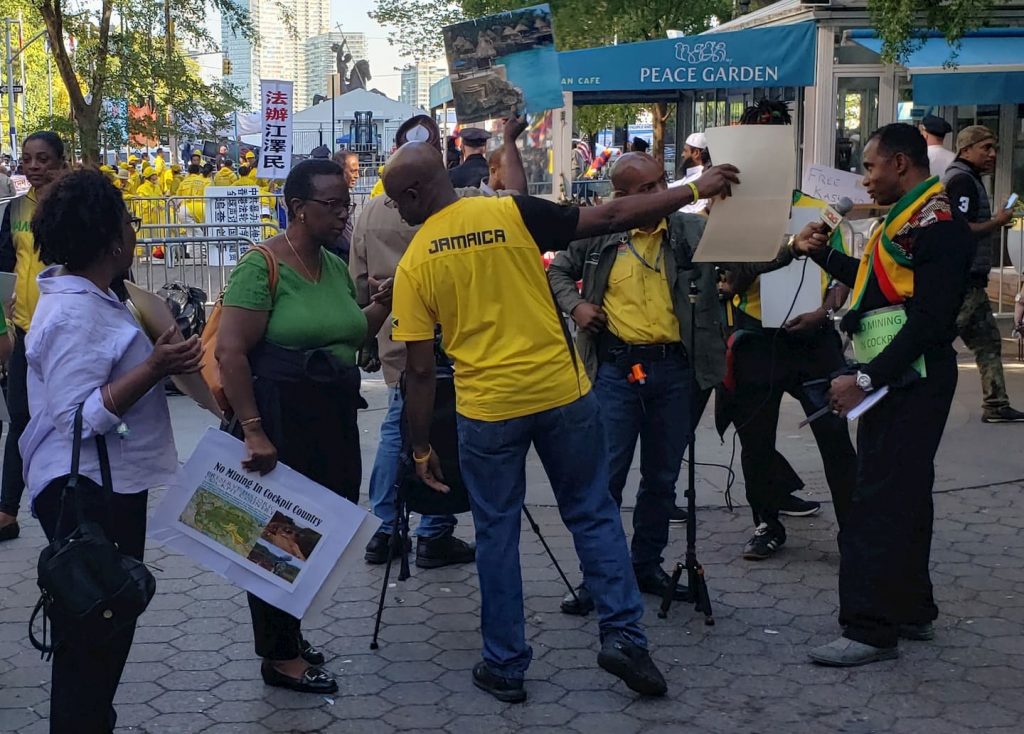Discontent within Caribbean diaspora communities is growing in intensity. To most governments in the region, peaceful demonstrations on the streets, far removed from the homeland, are viewed as non-threatening and inconsequential, thus easily ignored and dismissed. But they should take heed! What they see is only the tip of the iceberg.
Traditionally, diaspora’s passionate patriotism has been channelled through individual and collective contributions to nation-building. With few exceptions, diaspora communities have been silent, ignoring the lack of good governance, rule of law, corruption, human rights violations, and lack of citizen security, regardless of the political party in power at any given time. Diaspora members, watching from a distance, found ways to contribute to their homelands in spite of bureaucratic and prejudicial obstacles. While a few have engaged in advocacy, both with home governments and with succeeding US governments, attempts to speak with a unified voice have been stymied, in part, due to lack of broad effective and focused mechanisms within the diaspora.
Multi-media platforms – social media, online publications, and radio programmes – are now utilised increasingly by diaspora communities, as more members become engaged. Should the governments of the region fail to respond to, and respect the views of the diaspora, they will risk further alienating large numbers in diaspora communities. They will be hurting local economies and the people at home, especially those marginalised, who depend heavily on diaspora philanthropy.
On November 22, 2019, while Dominica’s foreign minister was at the Organization of American States (OAS) providing reasons for rejecting an OAS election observer mission and recommendations for urgent electoral reforms, a group of Dominica diaspora members protested peacefully at the OAS. Their mission was to expose, what they see as a series of deliberate undemocratic actions taken by the Dominican government in recent years. Their call for government reform is being ignored. These Dominicans should not be seen as political acolytes, but as patriots standing up for their country and for democracy in the Caribbean.
These patriots and other active Dominican diaspora leaders, raising important issues, should be encouraged. In response, the Dominican government and its supporters have resorted to personal partisan attacks against their fellow Dominicans, including by calling them traitors for highlighting important governance issues and advocating for reforms. The government, by its deliberate actions, instead of fostering a unified Dominican diaspora for the country’s benefit, is dividing the diaspora into partisan political factions. Tensions between the government and important segments of the country’s diaspora have risen to contentious levels. Their concerns, which are focused on corruption in the passport for citizenship programme, and the urgent need for electoral reform before the holding of the next general elections, should not be ignored by the government and the region.
Dominican diaspora concerns are being viewed through partisan political prisms, and the chasm between concerned members of the diaspora and the government is widening. Political intolerance is practiced and encouraged at the political leadership levels, aided and abetted by those who remain silent. There is no room accorded for contending views.
Autocratic style of governing is growing in the Caribbean. Challenges to democracy are increasing in countries once held up as beacons of democracy in the hemisphere and around the world. Autocratic-leaning leaders are taking solace from an uncharacteristic US government over the past two-and-a-half years. Should this trend be allowed to continue, these Caribbean showpieces of democracy will be reduced to mini dictatorships. We are not there yet, but there are troubling signs.

Similarly, some members of the Jamaican diaspora demonstrated outside the United Nations when world leaders, including the Jamaican Prime Minister, was present for the UN General Assembly (UNGA) in September, and subsequently at Times Square, in the heart of New York City. These Jamaican patriots are standing up to the Government’s decision to allow bauxite mining in the pristine Cockpit Country that will have an irreversible detrimental environmental impact on the country. Jamaicans at home and abroad are passionate about this issue and are taking action. The government seems incapable of acting prudently to preserve the patrimony of the country and protect the country’s fragile environment.
As Caribbean governments fail to act responsibly, diaspora discontent with governance in the region will grow and become more visible. Members of the Caribbean diaspora will not be silenced, and, with the growing access to multiple media platforms, as well as other forms of information technology, opportunities for affecting the dynamics of government-diaspora relationships are significantly enhanced. This is taking place in the context of growth in numbers and related economic and political influence of the Caribbean diaspora community. On fully realizing the extent of the diaspora as a force for change, policymakers in the US and the Caribbean will be forced to take notice. Actions by Caribbean and US governments that are antithetical to the interests, sovereignty, and the will of the people of the Caribbean, will be met with political resistance by an organised and emboldened diaspora community.
I am encouraged by members of the Jamaican and Dominican diasporas for visibly expressing their views, which are often unseen on social media platforms. As diaspora communities become more aware of issues affecting their home countries, and the American public at large of issues affecting America’s ‘Third Border’, the potential for growing alliances and shaping US policies in the region will grow exponentially. US policies, regardless of who occupies the White House, will be more responsive in a positive way.
Members of the Caribbean diaspora have grown frustrated with playing by rules established by those who wished to maintain hegemony over their roles in support of their homelands and countries of heritage. They’ve maintained harmony in their relations out of love for their respective countries. The rules were promulgated by Caribbean governments probably by default, or in collusion between, or imposed on the young nations of the Caribbean by the northern powers which hosted the vast majority of the Caribbean diaspora. Members of the diaspora are now saying these rules must change to include the interests of the diaspora, and not only to serve their respective countries.
The importance of economic and social support for diaspora native, or connected homeland, has grown significantly in recent years. While their charitable contributions are not easily quantified, the impact has been quite significant, in particular in health and education, and in the social and economic empowerment of the people. The flow of annual Caribbean diaspora remittances significantly impacts the economic viability of Caribbean countries. It is a one-way flow – from the diaspora to the countries. The diaspora is now demanding some return on these contributions; governments must be responsive to diaspora concerns and implement higher standards of governance and accountability for continued support.
While attending the UNGA in September 2019, the Prime Minister-led Jamaican delegation, including the Minister of Foreign Affairs and Foreign Trade (MFAFT), who has responsibilities for diaspora affairs, failed to engage with the diaspora while in New York. Yet, the prime minister found time for political fundraisers in New York, and at the residence of the Jamaican ambassador in Washington.
Members of the diaspora view these slights as a marginalisation of the diaspora’s importance. It’s out of sync with the government’s professed efforts on meaningful diaspora engagement. This slight occurred while the MFAFT was in the process of ardently promoting the new Global Jamaica Diaspora Council (GJDC), a group being established to advise the Jamaican government through, and under the control of the MFAFT.
There is lack of broad consultations by the government with the diaspora in formulating its new global diaspora policy framework, spawned the new GJDC, which will not be tasked with the representation of the diaspora, but merely as an advisory group to the government. Members of the Jamaican diaspora are led to conclude that the new GJDC is being organised to serve the government’s interests only, and not the mutual interests of Jamaicans at home and abroad.
A strategy often used by governments is to dismiss diaspora concerns as politically driven. Fostering partisan affiliations in the diaspora is anathema to the best interests of Caribbean countries and provide a pretext for dismissing diaspora views with which they disagree. Denying room for contending views is not conducive to a workable partnership. And, that’s why the Dominican and Jamaican diaspora patriots standing up is so important.
Ambassador Curtis Ward is a former ambassador of Jamaica to the United Nations with responsibility for Security Council affairs. He is the publisher of The Ward Post.







